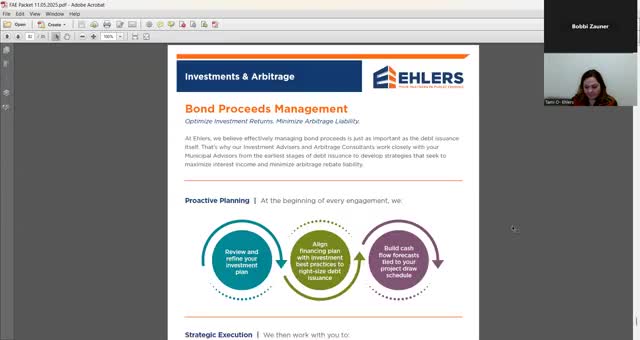Ehlers presents debt‑proceeds investment plan; committee raises fee and arbitrage concerns
Get AI-powered insights, summaries, and transcripts
Subscribe
Summary
Tammy Ochevsky of Ehlers presented the firm’s debt‑proceeds investment services and a conservative example projecting roughly $100,000 in net income for the village’s upcoming borrowing, but committee members raised concerns about the size of fees, net yield after fees and IRS arbitrage compliance.
Tammy Ochevsky of Ehlers presented investment-management services for the village’s upcoming debt issuance at the Finance Advisory and Enhancement Committee meeting on Nov. 5, 2025, explaining how the firm would invest bond proceeds, track arbitrage compliance and provide custodial and reporting services.
Ochevsky said the firm’s illustrative, conservative example — modeled on current U.S. Treasury yields and a phased project draw schedule — would produce “just under a $100,000 net to you,” and that the estimate was net of any platform fees. She described a mix of permissible instruments under Wisconsin law, including treasury securities, agency debt, short‑term commercial paper and marketable certificates of deposit, and said portfolios would be constructed to match project spend‑down and liquidity needs. Ehlers additionally offered a custodial reporting arrangement to centralize arbitrage compliance and make quarterly draws and reporting easier for village staff.
Committee members pressed on several practical points: how often construction draws typically occur, whether local bank products or a local government investment pool (LGIP) could provide comparable yields and how fees would affect net returns. Members flagged the example fees shown in the presentation as high relative to the estimated yield — the meeting transcript includes an example cited by attendees of “about $6,000 on $98,000” — and asked whether that level of compensation would erase material portions of any income. Ochevsky responded that fee impact depends on spend‑down timing and that the firm solicits competitive rates across regional and national banks before placing investments.
The committee also discussed federal tax rules on tax‑exempt debt and arbitrage, including when an issuance qualifies for small‑issue exceptions and when the IRS requires rebating excess earnings. Ochevsky said the village’s upcoming issuance qualified for certain exceptions (issuances under $5 million) but warned that larger future issuances could trigger stricter arbitrage compliance and reporting requirements.
No formal committee approval was taken on the Ehlers proposal. Committee members said they did not want to make a decision at the Nov. 5 meeting, recommended that the topic be presented to the full Village Board for education, and suggested revisiting the product next year when the village may face larger borrowings.
Committee members asked staff to collect additional information — including exact fee schedules, a clearer illustration showing net yields after fees and comparisons to local bank and LGIP alternatives — and to forward questions to Ehlers for written follow‑up.
The committee’s discussion on Nov. 5 centered on balancing predictable, fixed income from managed portfolios against fees that reduce net yield and on ensuring any program complies with Wisconsin investment limits and IRS arbitrage rules.
